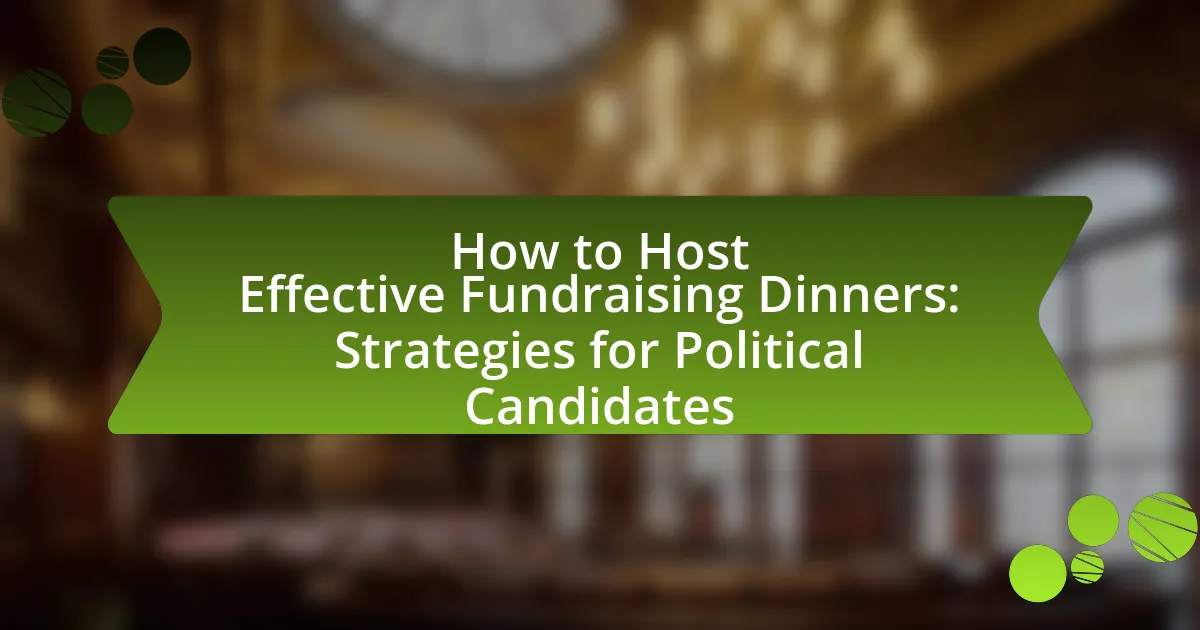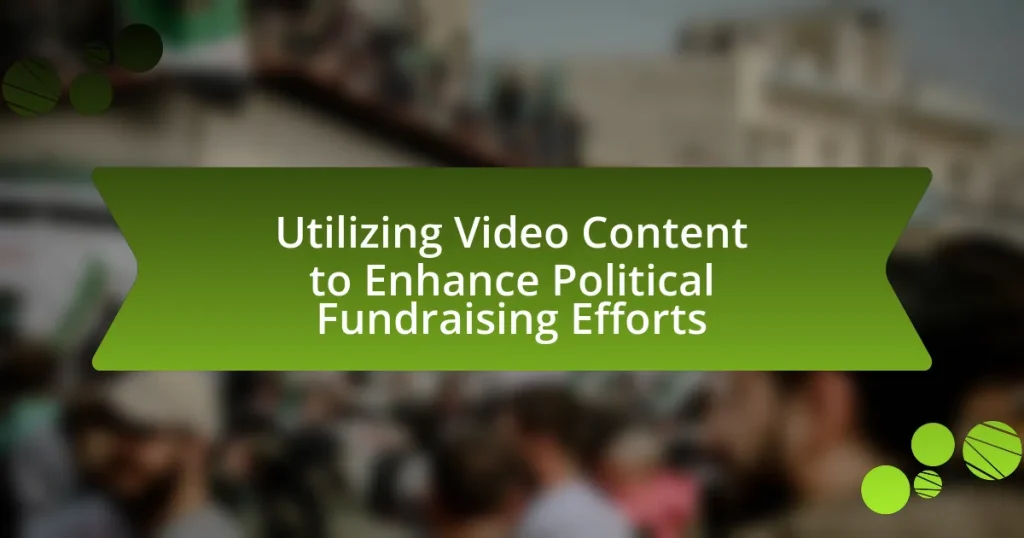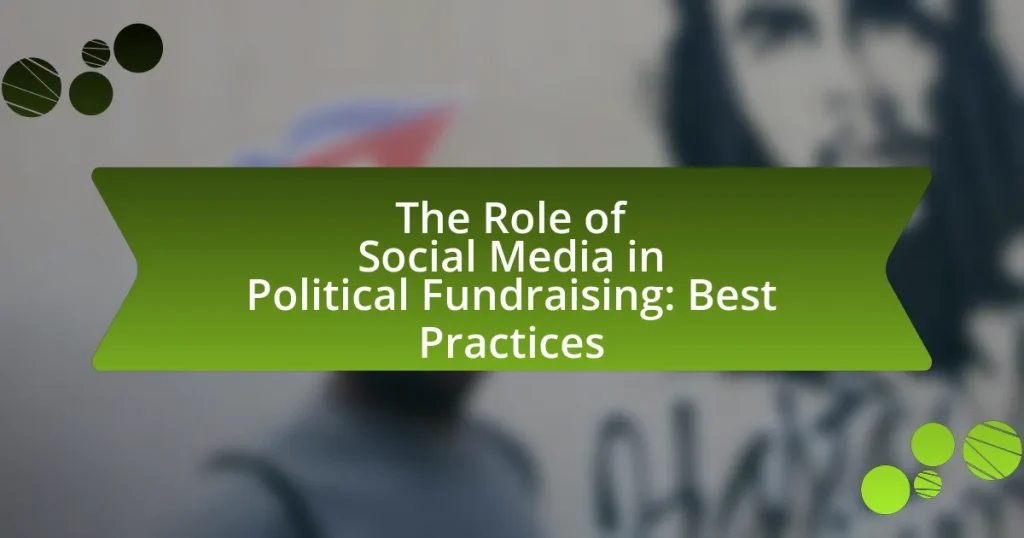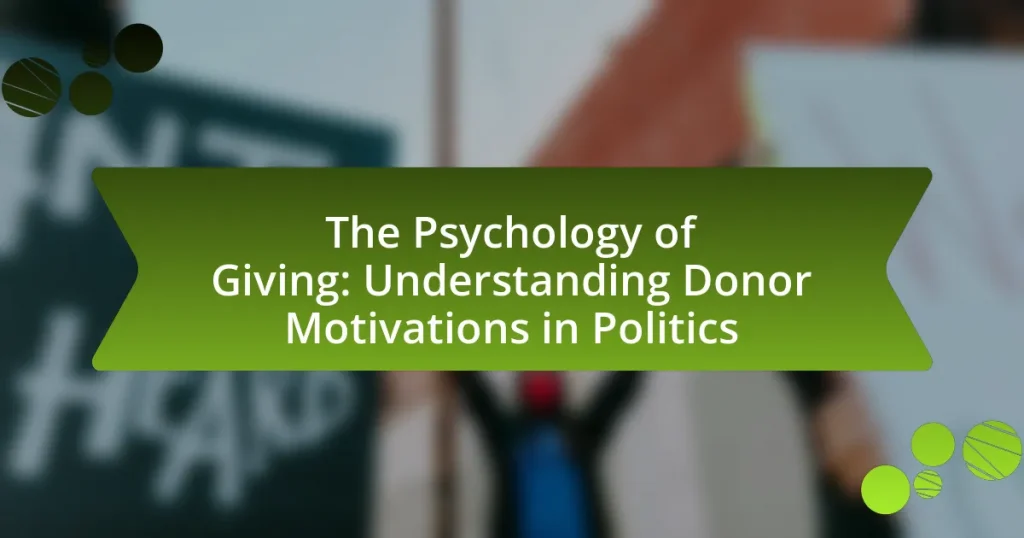The article focuses on effective strategies for hosting fundraising dinners aimed at political candidates. It outlines key elements such as identifying a target audience, crafting a compelling message, selecting an appropriate venue, and incorporating engaging programming to enhance attendee participation and donations. The article also emphasizes the importance of setting clear fundraising goals, creating an engaging guest list, and utilizing effective promotion methods, including social media outreach. Additionally, it discusses best practices for event execution, including smooth check-in processes, post-event follow-up strategies, and common pitfalls to avoid, all aimed at maximizing fundraising success.
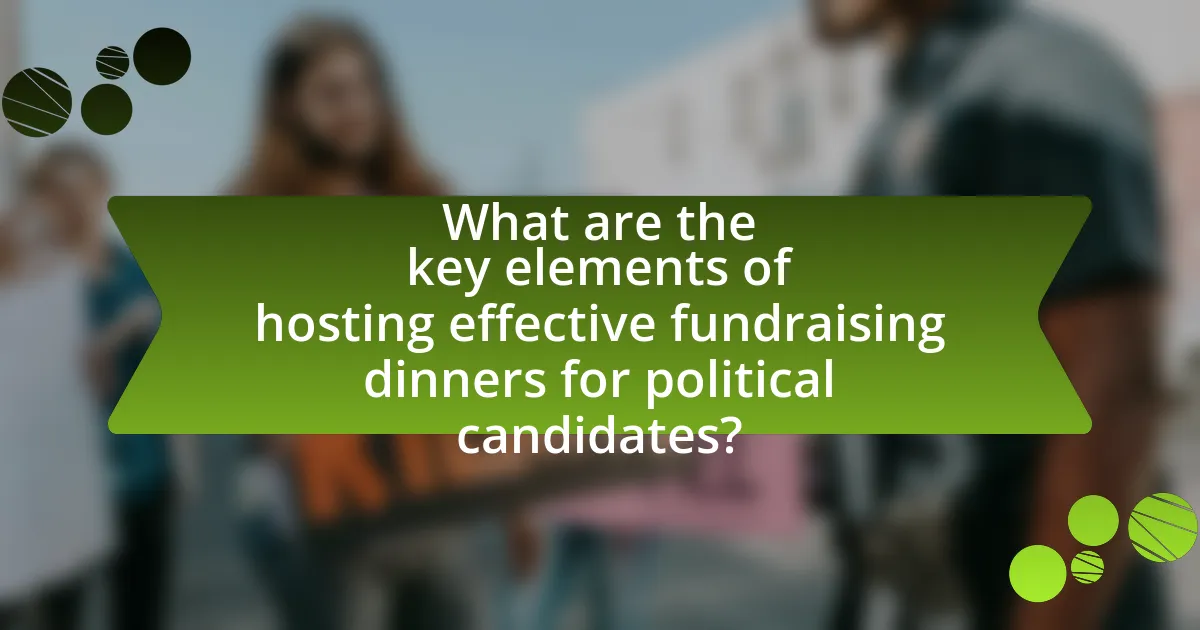
What are the key elements of hosting effective fundraising dinners for political candidates?
The key elements of hosting effective fundraising dinners for political candidates include a well-defined target audience, a compelling message, strategic venue selection, and engaging programming. Identifying and inviting supporters who align with the candidate’s values ensures a receptive audience, while a clear and persuasive message articulates the candidate’s vision and goals, motivating attendees to contribute. Choosing a venue that is accessible and reflects the candidate’s brand enhances the overall experience, and incorporating engaging programming, such as speeches or entertainment, fosters connection and encourages donations. These elements are supported by successful fundraising practices, which emphasize the importance of creating an inviting atmosphere that encourages participation and financial support.
How do you choose the right venue for a fundraising dinner?
To choose the right venue for a fundraising dinner, assess the venue’s capacity, location, and amenities to ensure it aligns with your event’s goals. A venue should comfortably accommodate your expected number of guests, ideally located near public transportation or parking to maximize attendance. Additionally, consider the venue’s facilities, such as audio-visual equipment and catering options, which can enhance the overall experience. Research shows that venues with convenient access and suitable amenities can increase guest satisfaction and engagement, ultimately leading to higher fundraising outcomes.
What factors should be considered when selecting a venue?
When selecting a venue for fundraising dinners, key factors include location, capacity, accessibility, ambiance, and cost. The location should be convenient for attendees, ideally near public transportation or parking options, to maximize attendance. Capacity must accommodate the expected number of guests comfortably, ensuring a welcoming atmosphere. Accessibility is crucial for all guests, including those with disabilities, to ensure inclusivity. The ambiance should align with the event’s theme and the candidate’s image, creating an inviting environment that encourages engagement. Finally, cost considerations must align with the fundraising budget, ensuring that venue expenses do not significantly diminish potential contributions. These factors collectively influence the success of the fundraising dinner, as evidenced by studies showing that venue choice directly impacts guest experience and overall event effectiveness.
How does the venue impact the overall atmosphere of the event?
The venue significantly impacts the overall atmosphere of the event by influencing attendees’ perceptions and interactions. A well-chosen venue can enhance the ambiance, making guests feel more comfortable and engaged, which is crucial for fundraising dinners. For instance, a sophisticated setting can convey professionalism and importance, encouraging higher donations, while a casual venue may foster a relaxed environment conducive to open discussions. Research indicates that the physical environment affects mood and behavior; for example, a study published in the Journal of Environmental Psychology found that aesthetically pleasing spaces can enhance social interactions and satisfaction levels among participants. Therefore, selecting an appropriate venue is essential for creating the desired atmosphere at fundraising dinners.
What is the importance of setting a clear fundraising goal?
Setting a clear fundraising goal is crucial because it provides direction and focus for the fundraising efforts. A well-defined goal helps to motivate donors and volunteers, as it creates a sense of purpose and urgency. Research indicates that campaigns with specific financial targets are more likely to achieve their fundraising objectives, as they can tailor their messaging and strategies to align with the goal. For instance, a study by the Nonprofit Research Collaborative found that organizations with clear fundraising goals raised 30% more than those without defined targets. This demonstrates that clarity in goals not only enhances engagement but also significantly impacts overall fundraising success.
How can a fundraising goal influence event planning?
A fundraising goal significantly influences event planning by determining the scale, budget, and logistics of the event. When a specific financial target is set, planners can allocate resources effectively, ensuring that venue selection, catering, and promotional efforts align with the goal. For instance, if a candidate aims to raise $50,000, the event may require a larger venue and more extensive marketing compared to a goal of $10,000. Additionally, the fundraising goal shapes the guest list, as higher targets often necessitate inviting more affluent donors or sponsors who can contribute larger amounts. This strategic alignment between the fundraising goal and event planning enhances the likelihood of meeting or exceeding the financial objectives.
What strategies can be used to effectively communicate the fundraising goal to attendees?
To effectively communicate the fundraising goal to attendees, political candidates should utilize clear messaging, visual aids, and personal storytelling. Clear messaging ensures that attendees understand the specific financial target, such as stating, “We aim to raise $50,000 tonight to support our campaign.” Visual aids, like charts or progress bars displayed during the event, can illustrate how close the campaign is to reaching its goal, making the target more tangible. Personal storytelling can engage attendees emotionally, as sharing anecdotes about how the funds will impact the community can motivate contributions. Research indicates that emotional appeals can increase donation amounts, as demonstrated in studies by the Stanford Social Innovation Review, which found that narratives significantly enhance fundraising effectiveness.
How do you create an engaging guest list for your fundraising dinner?
To create an engaging guest list for your fundraising dinner, identify individuals who are passionate about your cause and can contribute to the event’s success. This includes potential donors, influential community leaders, and supporters who have a vested interest in your political campaign or mission. Engaging guests often have networks that can amplify your message and increase fundraising potential.
Research shows that personal connections significantly enhance attendance and engagement; for instance, a study by the Association of Fundraising Professionals indicates that events with a strong personal touch see a 30% increase in participation. Therefore, leveraging existing relationships and inviting guests who can bring additional supporters will create a more dynamic and effective fundraising environment.
What criteria should be used to select potential attendees?
To select potential attendees for fundraising dinners, criteria should include their financial capacity, political influence, and alignment with the candidate’s values. Financial capacity ensures attendees can contribute meaningfully to the fundraising goal, as studies show that individuals with higher disposable income are more likely to donate (National Philanthropic Trust, 2021). Political influence is crucial because attendees with established networks can amplify the candidate’s message and reach, enhancing fundraising efforts. Lastly, alignment with the candidate’s values fosters genuine support and engagement, which is essential for building lasting relationships and encouraging future contributions.
How can you leverage existing networks to expand your guest list?
To leverage existing networks for expanding your guest list, actively engage with current supporters and their connections. Political candidates can utilize social media platforms, email newsletters, and personal outreach to encourage supporters to invite friends and family, thereby broadening the guest base. Research indicates that personal invitations significantly increase attendance rates; for instance, a study by the National Democratic Institute found that personal outreach can boost event participation by up to 50%. By tapping into these networks, candidates can create a ripple effect, enhancing visibility and fostering community involvement.
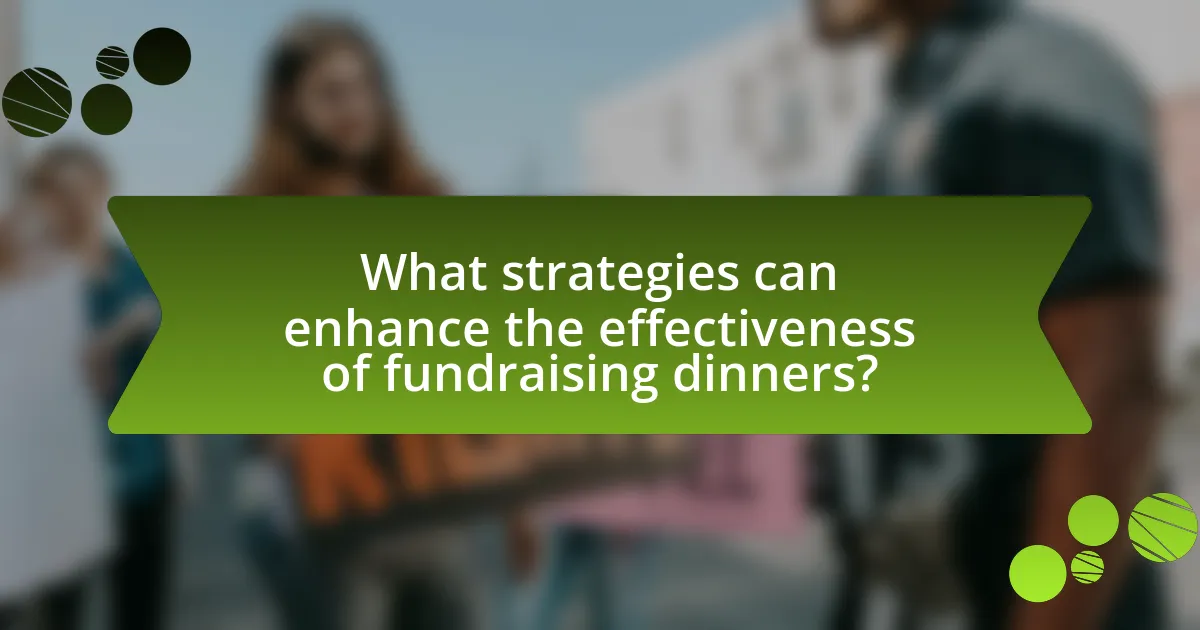
What strategies can enhance the effectiveness of fundraising dinners?
To enhance the effectiveness of fundraising dinners, political candidates should focus on strategic guest selection, engaging programming, and clear communication of the cause. Selecting guests who are not only potential donors but also influential community members can significantly increase fundraising potential. Engaging programming, such as keynote speakers or live entertainment, keeps attendees interested and encourages donations. Clear communication about the cause, including specific funding goals and the impact of contributions, fosters a sense of urgency and purpose, motivating attendees to give. Research indicates that events with a strong emotional appeal can increase donations by up to 30%, demonstrating the importance of these strategies in maximizing fundraising outcomes.
How can you develop a compelling event theme?
To develop a compelling event theme, identify the core message that resonates with your target audience and aligns with the goals of the fundraising dinner. This involves researching the interests and values of potential attendees, which can be achieved through surveys or analyzing past event feedback. For instance, a theme centered around community empowerment can attract local supporters by emphasizing shared values and goals. Additionally, incorporating storytelling elements related to the theme can enhance emotional engagement, making the event more memorable. Research indicates that events with strong thematic coherence can increase attendee satisfaction and participation rates, as seen in studies by the Event Marketing Institute, which highlight the importance of thematic relevance in event success.
What elements contribute to a successful event theme?
A successful event theme is primarily defined by its relevance, creativity, and coherence. Relevance ensures that the theme aligns with the purpose of the event, such as fundraising for a political candidate, which can enhance engagement and support. Creativity captures the audience’s attention and makes the event memorable, while coherence maintains a consistent message throughout the event, from invitations to decor and activities. For example, a fundraising dinner themed around a candidate’s core values can effectively resonate with attendees, fostering a sense of community and purpose.
How does a theme influence guest engagement and donations?
A theme significantly influences guest engagement and donations by creating a cohesive and immersive experience that resonates with attendees. When a fundraising dinner has a well-defined theme, it can enhance the emotional connection guests feel towards the cause, leading to increased participation and willingness to contribute financially. For instance, research indicates that events with a strong thematic focus can boost attendee satisfaction and perceived value, which correlates with higher donation amounts. A study published in the Journal of Nonprofit & Public Sector Marketing found that thematic events can increase donor engagement by up to 30%, demonstrating the direct impact of a theme on both engagement and financial support.
What role does the program agenda play in a fundraising dinner?
The program agenda in a fundraising dinner serves as a structured outline that guides the event’s flow and ensures that key objectives are met. It organizes the sequence of activities, such as speeches, presentations, and entertainment, which helps maintain audience engagement and focus on the fundraising goals. A well-defined agenda can enhance the overall experience for attendees, making them more likely to contribute financially. Research indicates that events with clear agendas can increase participant satisfaction and perceived value, ultimately leading to higher donation amounts.
How can you structure the agenda to maximize donor engagement?
To maximize donor engagement, structure the agenda by incorporating interactive elements, personal stories, and clear calls to action. Begin with a warm welcome and an overview of the evening’s purpose, followed by a personal story from the candidate that resonates with the audience, fostering emotional connections. Include interactive segments, such as Q&A sessions or small group discussions, to encourage participation and dialogue. Conclude with a clear call to action, outlining specific ways donors can contribute or get involved. Research indicates that events with personal narratives and interactive components increase donor commitment and satisfaction, as evidenced by a study from the Association of Fundraising Professionals, which found that engagement strategies significantly enhance donor retention rates.
What types of speakers or entertainment can enhance the event experience?
Engaging speakers and entertainment that can enhance the event experience include motivational speakers, industry experts, and live performers. Motivational speakers can inspire attendees and create a positive atmosphere, while industry experts provide valuable insights relevant to the fundraising cause, fostering deeper connections among participants. Live performers, such as musicians or comedians, can entertain guests, making the event more memorable and enjoyable. Research indicates that events with engaging entertainment can increase attendee satisfaction and participation, ultimately leading to higher fundraising outcomes.
How can you effectively promote your fundraising dinner?
To effectively promote your fundraising dinner, utilize a multi-channel marketing approach that includes social media, email campaigns, and local community outreach. Research shows that events promoted through multiple channels can increase attendance by up to 50%. Create engaging content that highlights the purpose of the dinner, the impact of donations, and any special guests or speakers. Additionally, leverage partnerships with local businesses and influencers to expand your reach. According to a study by Eventbrite, events with strong community ties see higher engagement and participation rates.
What channels are most effective for promoting fundraising events?
Social media platforms, email marketing, and community partnerships are the most effective channels for promoting fundraising events. Social media allows for targeted outreach and engagement, with platforms like Facebook and Instagram enabling event promotion to specific demographics. Email marketing provides a direct line to supporters, allowing for personalized invitations and updates, which can significantly increase attendance. Community partnerships leverage local networks and organizations to broaden reach and enhance credibility, often resulting in increased participation. According to a study by the Nonprofit Marketing Guide, 70% of nonprofits reported that social media was their most effective channel for event promotion, highlighting its importance in fundraising strategies.
How can social media be utilized to increase attendance and donations?
Social media can be utilized to increase attendance and donations by creating targeted campaigns that engage potential attendees and donors. Political candidates can leverage platforms like Facebook, Twitter, and Instagram to share compelling content, such as event details, personal stories, and testimonials, which resonate with their audience. For instance, using Facebook Events allows candidates to invite followers directly, while Instagram Stories can showcase behind-the-scenes preparations, generating excitement and anticipation.
Additionally, social media advertising can target specific demographics, ensuring that the message reaches individuals most likely to attend and contribute. According to a report by the Pew Research Center, 69% of adults in the U.S. use Facebook, making it an effective platform for outreach. Furthermore, incorporating donation links in posts and utilizing features like Facebook Fundraisers can streamline the donation process, encouraging immediate contributions. This strategic use of social media not only boosts attendance but also enhances fundraising efforts through increased visibility and engagement.
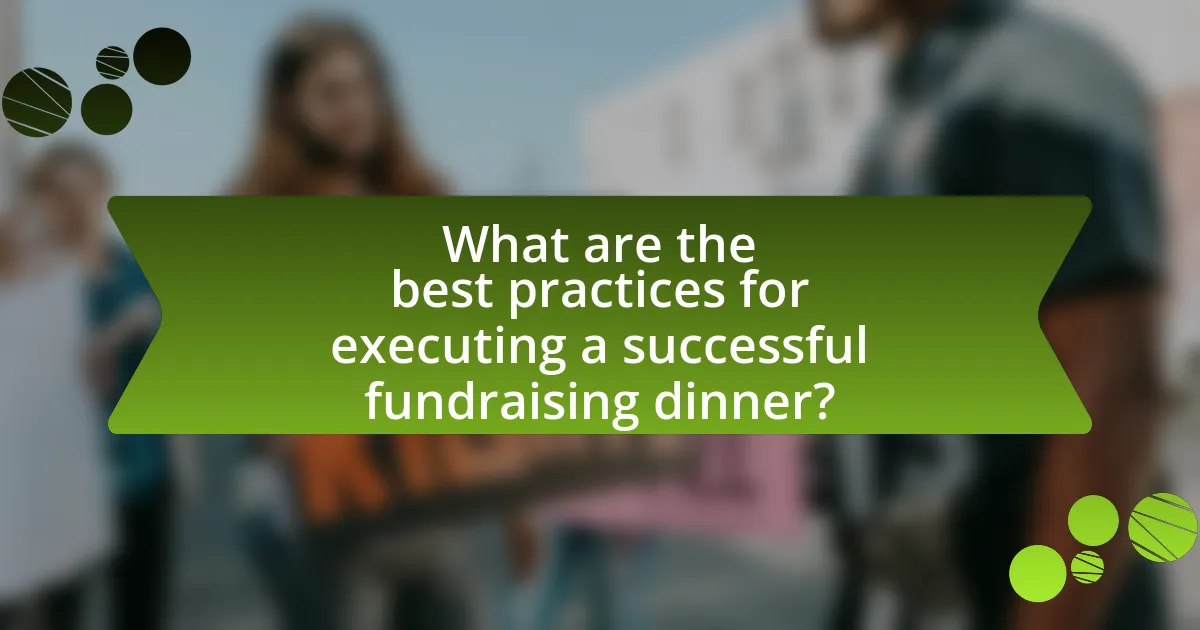
What are the best practices for executing a successful fundraising dinner?
The best practices for executing a successful fundraising dinner include careful planning, effective promotion, and engaging programming. First, establish a clear goal for the event, such as a specific fundraising target, which helps guide all planning efforts. Next, select an appropriate venue that aligns with the expected guest list and budget; for instance, a venue that can comfortably accommodate the anticipated number of attendees while providing necessary amenities.
Effective promotion is crucial; utilize multiple channels such as social media, email newsletters, and personal invitations to reach potential donors. Engaging programming, including a compelling speaker or entertainment, can enhance the experience and encourage donations. According to a study by the Association of Fundraising Professionals, events with engaging content can increase attendee donations by up to 30%.
Finally, ensure follow-up communication post-event to thank attendees and report on the impact of their contributions, which fosters long-term relationships and encourages future support.
How can you ensure a smooth check-in process for guests?
To ensure a smooth check-in process for guests, implement a pre-registration system that collects essential information in advance. This approach minimizes wait times and allows for efficient verification upon arrival. According to a study by the Event Marketing Institute, events that utilize pre-registration can reduce check-in times by up to 50%, enhancing the overall guest experience. Additionally, providing clear signage and trained staff at the check-in area further streamlines the process, ensuring guests feel welcomed and informed.
What tools or systems can streamline the check-in experience?
Digital check-in systems, such as Eventbrite and Whova, can significantly streamline the check-in experience for fundraising dinners. These platforms allow for pre-registration, QR code scanning, and real-time attendee tracking, which reduces wait times and enhances organization. According to a study by Eventbrite, events utilizing digital check-in tools can decrease check-in times by up to 50%, leading to a smoother experience for both hosts and attendees.
How can you make guests feel welcomed upon arrival?
To make guests feel welcomed upon arrival, greet them warmly and personally. A friendly smile and a genuine “hello” create an inviting atmosphere. Additionally, offering a welcome drink or snack can enhance the experience, as studies show that hospitality gestures significantly improve guest satisfaction. For instance, a survey by the American Hotel and Lodging Educational Institute found that 80% of guests appreciate personalized greetings and refreshments upon arrival, reinforcing the importance of these actions in making guests feel valued and comfortable.
What follow-up strategies should be implemented post-event?
Post-event follow-up strategies should include sending personalized thank-you notes to attendees, which reinforces relationships and encourages future support. Research indicates that personalized communication increases donor retention rates by up to 40%. Additionally, sharing event highlights and outcomes through email newsletters or social media keeps the momentum going and informs supporters about the impact of their contributions. Engaging attendees through surveys can provide valuable feedback for future events, with studies showing that 70% of organizations that solicit feedback see improved event satisfaction. Lastly, scheduling one-on-one meetings with key donors can deepen connections and discuss future contributions, as personal engagement is crucial in fundraising efforts.
How can thank-you notes impact future fundraising efforts?
Thank-you notes can significantly enhance future fundraising efforts by fostering donor relationships and encouraging repeat contributions. When donors receive personalized thank-you notes, they feel appreciated and valued, which can lead to increased loyalty and a higher likelihood of future donations. Research indicates that expressing gratitude can improve donor retention rates; for instance, a study by the Association of Fundraising Professionals found that personalized communication increases donor engagement by up to 50%. This demonstrates that effective thank-you notes not only acknowledge past contributions but also lay the groundwork for sustained support in future fundraising initiatives.
What methods can be used to gather feedback from attendees?
Surveys and questionnaires are effective methods to gather feedback from attendees. These tools can be distributed electronically or in paper form, allowing attendees to provide their opinions on various aspects of the event, such as organization, content, and overall experience. Research indicates that 70% of event organizers use post-event surveys to assess attendee satisfaction and improve future events. Additionally, informal discussions and focus groups can provide qualitative insights, enabling organizers to understand attendees’ feelings and suggestions in depth.
What are common pitfalls to avoid when hosting fundraising dinners?
Common pitfalls to avoid when hosting fundraising dinners include poor planning, lack of clear goals, and inadequate communication with attendees. Poor planning can lead to logistical issues such as venue problems or insufficient seating, which can detract from the event’s success. Lack of clear goals may result in ineffective fundraising efforts, as organizers might not know how much money they aim to raise or how to engage attendees effectively. Inadequate communication can lead to low attendance or misunderstandings about the event’s purpose, ultimately affecting fundraising outcomes. These pitfalls can significantly hinder the effectiveness of fundraising dinners, as evidenced by numerous case studies highlighting the importance of thorough preparation and clear objectives in successful fundraising events.
How can poor planning affect the success of the event?
Poor planning can significantly undermine the success of an event by leading to logistical failures, inadequate resource allocation, and a negative attendee experience. For instance, if a fundraising dinner lacks a clear agenda or timeline, it may result in disorganization, causing delays and confusion among guests. Research indicates that 70% of event attendees cite organization as a key factor in their overall satisfaction (Eventbrite, 2020). Additionally, insufficient planning can lead to budget overruns, as unexpected costs arise from last-minute arrangements. This financial mismanagement can detract from the event’s fundraising goals, ultimately impacting the candidate’s ability to garner support.
What strategies can mitigate risks associated with fundraising dinners?
To mitigate risks associated with fundraising dinners, political candidates should implement comprehensive planning, including thorough venue assessments, clear budgeting, and effective communication strategies. Conducting a risk assessment of the venue ensures safety and compliance with regulations, while establishing a detailed budget helps avoid financial pitfalls. Additionally, clear communication with attendees regarding event details and expectations minimizes misunderstandings. According to a study by the Nonprofit Risk Management Center, organizations that engage in proactive risk management practices can reduce potential liabilities by up to 30%.
What practical tips can ensure the success of your fundraising dinner?
To ensure the success of your fundraising dinner, focus on meticulous planning and effective engagement strategies. Start by selecting a suitable venue that aligns with your budget and can accommodate your expected guest list, as the right atmosphere can significantly enhance the event’s appeal. Next, create a compelling agenda that includes engaging speakers or entertainment, which can increase attendee interest and participation.
Additionally, promote the event through targeted outreach to potential donors, utilizing social media, email campaigns, and personal invitations to maximize attendance. Research indicates that personalized invitations can increase response rates by up to 30%.
Finally, follow up with attendees after the event to express gratitude and share the impact of their contributions, reinforcing their connection to your cause and encouraging future support. These strategies, when executed effectively, can lead to a successful fundraising dinner that meets or exceeds financial goals.
